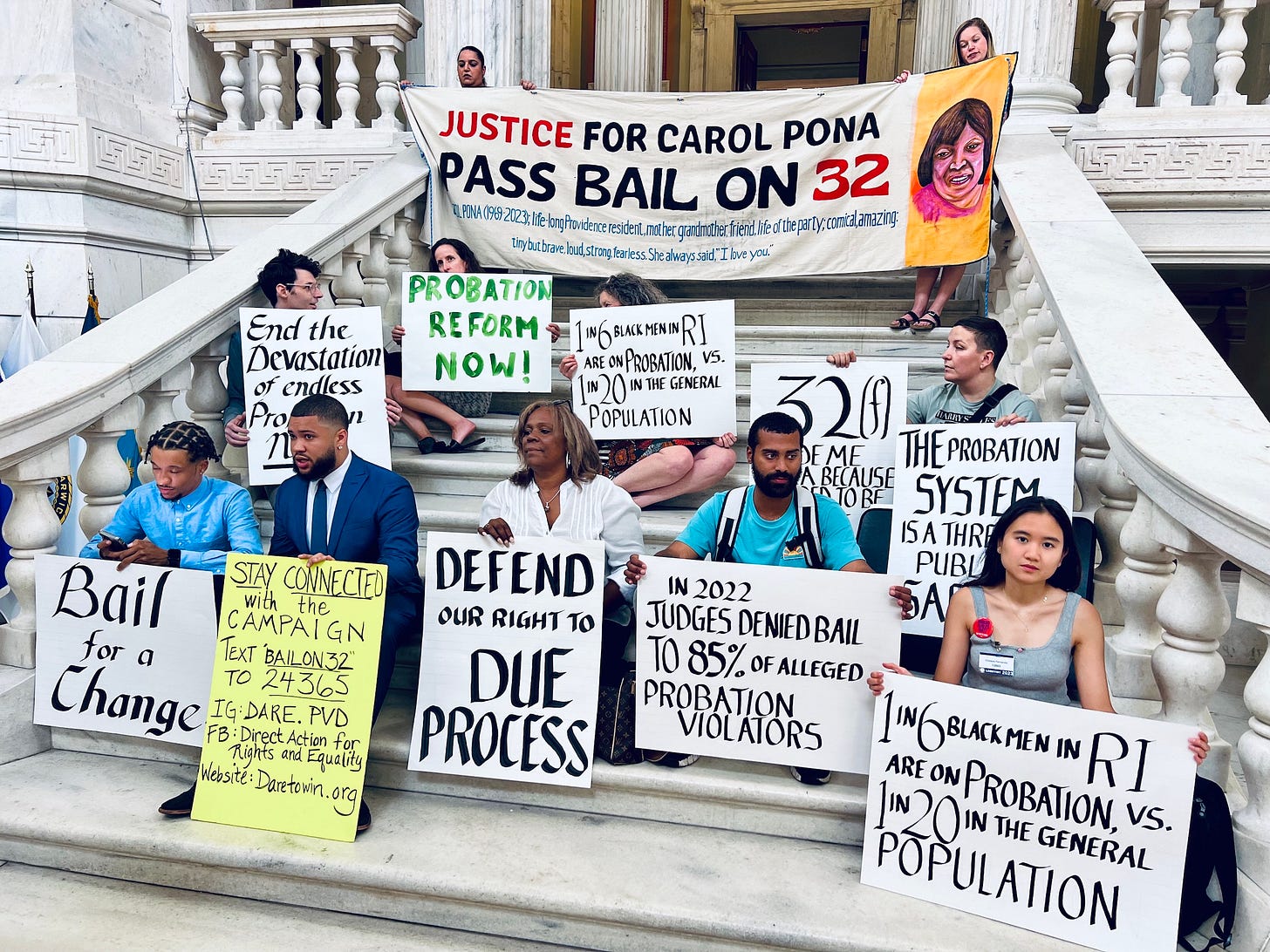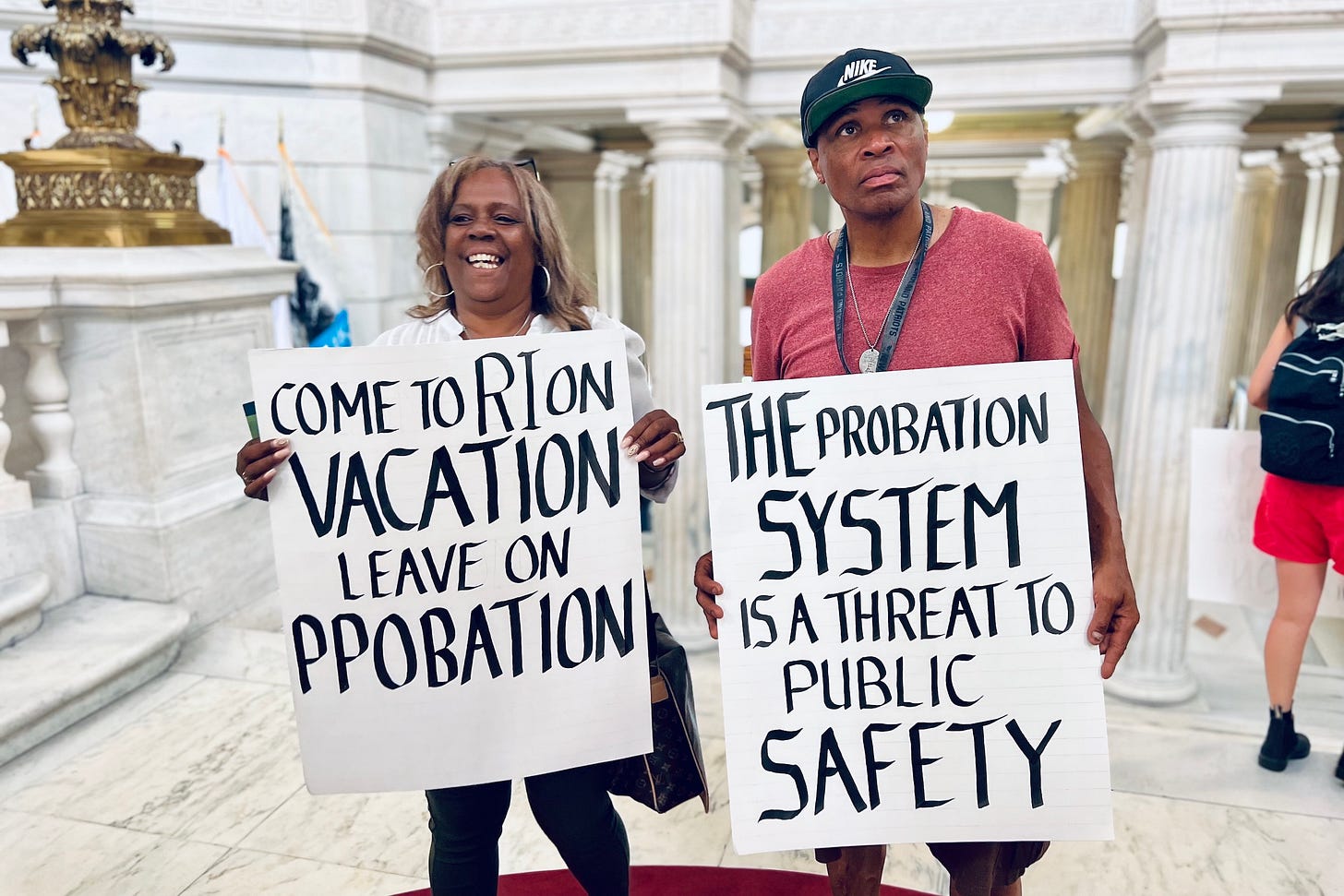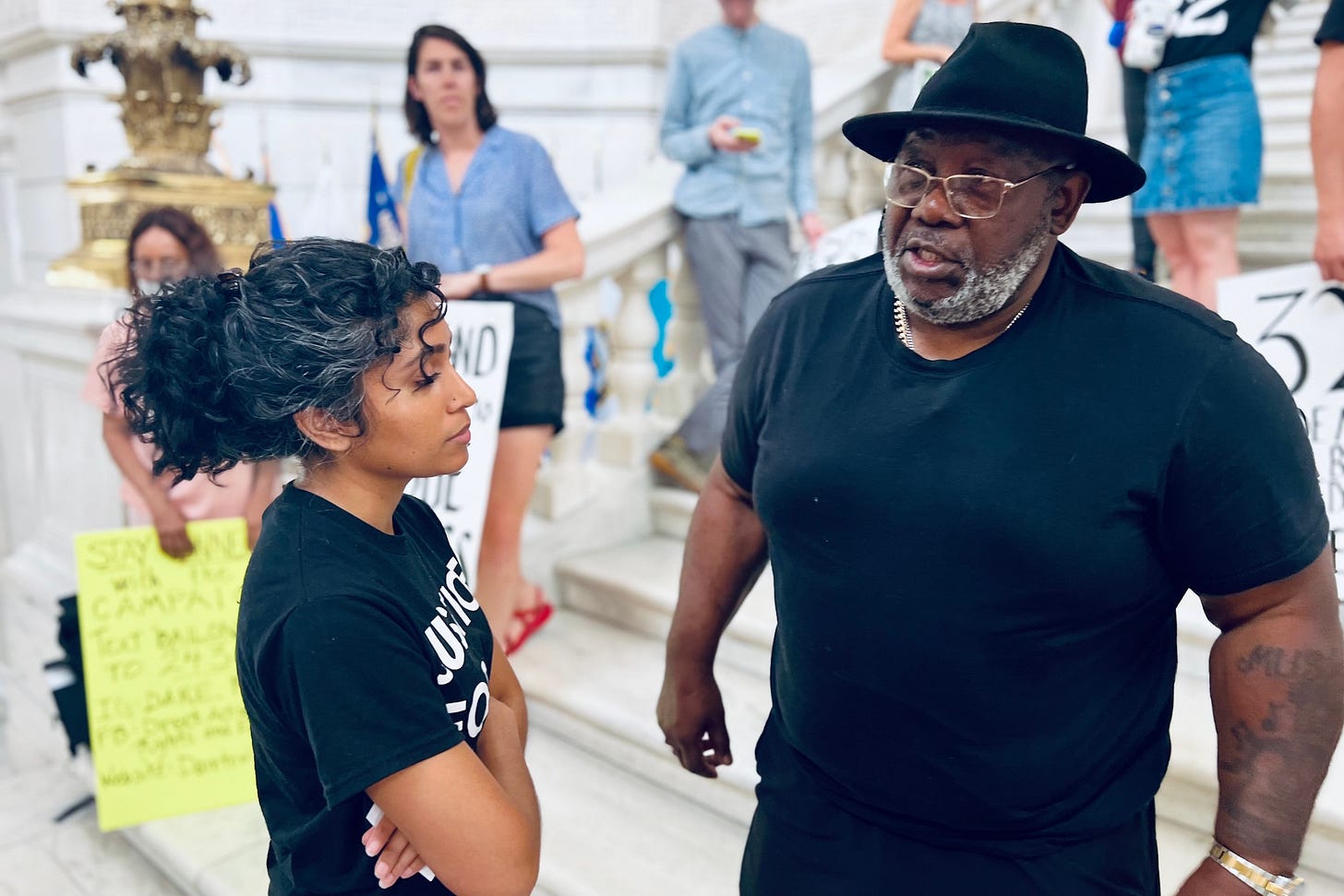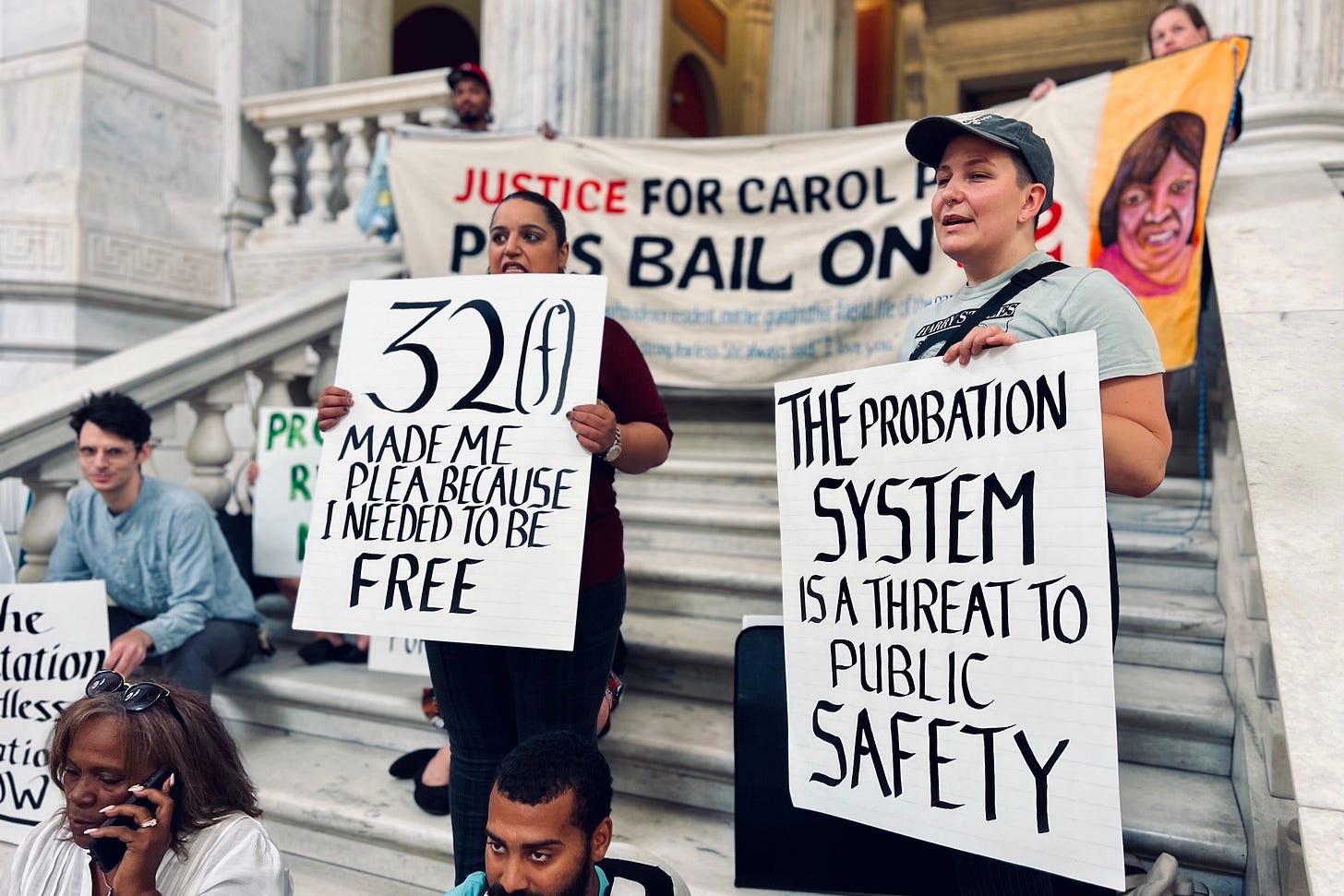Bail on 32 Coalition decries General Assembly's failure to pass criminal justice reform bills
“This is what institutional power and racism look like. We are sickened by these entities' refusal to engage with Black, brown, and low income people..."
“We're here to call out the racist, classist adherence to the status quo by Rhode Island's elites, from the Attorney General, to the Judiciary Branch, to the Rhode Island Department of Corrections, to the Rhode Island Brotherhood of Correctional Officers, to the General Assembly,” said Anusha Alles, interim director of Direct Action for Rights and Equality (DARE). “Today you'll hear from representatives of several large, grassroots, directly impacted led campaigns who have led efforts to address the prison system's long-standing, racial and class inequities. All of these campaigns have been shut down by the General Assembly, sometimes after years of organizing.”
Over two dozen people gathered in the Rhode Island State House rotunda to rally against the General Assembly’s failure to pass any of the criminal justice reform bills advocates have worked to pass in committee meetings that stretched to the early morning hours and in behind the scenes negotiations with lawmakers and “stakeholders” such as the Attorney General and the Brotherhood of Correctional Officers.
“We put in a lot of effort,” said Juan Turbidez, a staff person at DARE. “Directly impacted people have meetings every Wednesday. We've been lobbying and door knocking, just to be told, ‘no.’ We were in communication with the Attorney General's office throughout all of this and they said they weren't going to get in it. We just did an amendment recently, which we didn't want to do. We did it to pass the bill, so the Attorney General [would not] block it. All the work that we put into this bill, everybody showing up to the meetings, they got a lot of stuff going on just for us to be told, ‘No.’
“It sucks.”
“Did you know that all of these entities, the Attorney General, the Judiciary Branch, the Rhode Island Department of Corrections, Rhode Island Brotherhood of Correctional Officers, and the General Assembly are connected? Whether that's through campaign donations and sponsoring political ads or professional career determining relationships between legislatures and courts, to generations of legacy appointments and social capital being passed down.
“This is what institutional power and racism look like. We are sickened by these entities' refusal to engage with Black, brown, and low income people who have been directly impacted by the prisons, police and court systems.
“To the General Assembly: Do you understand that your actions are killing Rhode Islanders? Do you take responsibility for the families and communities you have destroyed through your ignorance and through your inaction? Do you recognize that you have jeopardized Rhode Island's public safety and wellbeing?
“We are demanding that the General Assembly return to session by September 1st, 2023, to put these crucial life-saving policies in effect. There is precedent for this under emergency situations - and this is an emergency. Perhaps it does not seem like an emergency to folks who are not sitting with loved ones in jail, folks who are not going through the court system. But it is an emergency for our communities. Our community is under attack and it has been under attack.”
Rhode Island has the second highest rate of probation in the United States, nearly 1 in 20 of us are on probation. The state ranks third for length of probation sentences. The Bail on 32 Coalition was formed to bring needed changes to the system. “Under our current system, people on probation are typically held for at least two weeks if accused of a 32F violation,” writes the Coalition on their website. “In those two weeks, folks can lose their jobs, housing, custody of their kids and more. Even if the violation is later cleared, people have already undergone traumatic losses. By threatening individuals with incarceration, the courts coerce people into plea deals, including longer probation sentences.”
Despite hearings that sometimes lasted until after 2am, both the the Senate and House Judiciary Committees held the bills for further study, effectively scuttling them for the session. No votes were taken.
Another bill that went nowhere this session was an effort to reform the practice of solitary confinement in our prisons. Joe Benton, a member of DARE’s Behind the Walls Committee, called elected officials cowards for not doing something about a practice the United Nations has called torture. Benton also talked about people on probation being unjustly incarcerated while they await a hearing, leading to job loss and family disruption.
“I am going to speak about the solitary reform efforts, but I'm also going to talk about 85% of the people that are currently incarcerated in the intake center are there for violation hearings,” said Benton. “What that does is destroy our community. Let me tell you briefly how that affects our community. When someone has a violation, they hold them and they give them what they call cell therapy. If we lock you up and hold you long enough and we play this game with you, when we're ready to violate you or for you to take a deal, you'll take it. That's one of the reasons why this percentage is so high. And Peter Neronha knows it because he sees these numbers.
“Black and brown people are tired of them mistreating us because that's exactly what they're doing.When you looking at prison, what you're going see is Black and brown people. And we're going to have to do something about it. Whether we vote them out, one way or another, we have to take action.
“In regard to solitary confinement, everybody knows that sensory deprivation, by sitting alone by yourself, being treated like an animal and [then] expected to walk back out into the street and function in society... It is outrageous that they're not taking action to reform solitary confinement. I've been there. I've seen the people suffering there, and it's about time that somebody makes some changes. These guys [legislators] are cowards because they operate at the behest of certain individuals. We come here day after day, week after week, seeking some kind of help and support, but these cowards ain't making no changes. They want our community to suffer. When you go through South Providence and through the Black and brown community, you see the devastation that they did to our community. And they continue to do it by locking up our kids.
“Not only that, nobody should die waiting for a violation hearing. They know the general law says two weeks, but they leave you there for months and they know it. So it is time for them to reform it and stop being cowards!”
Haley McKee has been advocating for smarter substance use policies at the State house since 2017. She had been working all year to pass a defelonization bill that would keep people out of jail, and provide a chance for them to seek medical care for their addiction. That bill was also scuttled in the last hours of the General Assembly.
“I've been working on drug policy reform as well as criminal justice reform in this building since 2017 and this year is the saddest year that I've ever seen, even besides Covid and all of the other things,” said McKee. “This whole entire building is ignoring our community's cries for help. Meanwhile, we, as people who have experienced the same systems that we're appealing to reform, have to sit it out until 2:30 in the morning. It's just a matter of a simple phone call to kill our bills and our community efforts.
“We're not asking for them to pass our legislation. We're just asking them to put these bills to a floor vote, which is what is the democratic system is supposed to be about. Then we'll see these bills pass because trust and believe, all of these bills have teeth to them. They're all evidence based, there are established precidents for this kind of reform all over the country.
“The issue that I've been working on in particular, the defelonization drug policy that I've been working on for six years now, had no opposition this session. It has precedent in better than half of the states in the United States and has seen good results. I was told last night that one individual, despite looking like it was going to committees and that most committee members were in favor, that he didn't like it.
“That's been my general experience in this space. I think we need to hold lawmakers accountable, get back into this space, have these bills put to the floor and actually show what they're really made of because we can't keep relying on people who are victimized by the same systems that we're trying to reform to carry the weight of these efforts and come up empty handed every single year. This is not democracy. This is not what our elected officials are supposed to be doing.”
The Law Enforcement Officers Bill of Rights (LEOBOR) is a series of protections for police officers in Rhode Island accused of misconduct. Many advocate see LEOBOR as an impediment to holding police accountable. Bills to repeal LEOBOR have long been of the table, but bills to reform LEOBOR, weak as they were, have also been blocked this year.
“We come here every day, we testify, we talk to legislators,” said Harrison Tuttle, President of the Black Lives Matter RI PAC. “We try to get to legislators before they come in to vote - not on our bills, but other bills. And they say, ‘We'll talk’ and then we can't get a meeting with them. We don't have any stakeholder powers. And what democracy do we have if the people who are most affected by it don't have a seat at the table, being able to make these decisions. With the misinformation, with the lack of floor votes this year, with all this talk around equity and justice, I'm not seeing any meaningful things that affect Black and brown people and low-income people's lives that would really make a difference.
“Only 13 states in the entire country that have LEOBOR. The sky is not going to fall if we repeal it. Some are Republican states that don't have LEOBOR. So I don't want to hear that this is a politically progressive, liberal, or a conservative thing. This is a human thing and we've got to start acting with some morality in this building because people's lives are being ruined as a result of it.”








